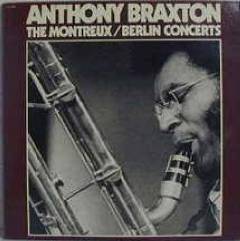Anthony Braxton - The Montreux / Berlin Concerts (1977)
Anthony Braxton - The Montreux / Berlin Concerts (1977)

1. Opus 40M 2. Opus 23J 3. Opus 40 4. Opus 6F 5. Opus 40K 6. Opus 6C 7. Opus 63 Anthony Braxton - Saxophone [Sopranino, Alto, Contrabass], Flute, Clarinet Kenny Wheeler – trumpet George Lewis – trombone Dave Holland – bass Barry Altschul - Drums, Percussion, Gong
In 1970, the Chick Corea trio with Dave Holland and Barry Altschul became the co-operative quartet Circle with the addition of Anthony Braxton. This unique and often brilliant quartet was so co-operative that it was inevitably doomed by the strong individualism and creativity of its members. Just before its demise in 1971, Braxton recorded a double album for Freedom Records that featured duets with Chick and a quartet of Dave, Barry and Kenny Wheeler.
Circle crumbled, leaving behind a legacy of recorded works on CBS in Japan, ECM in Germany and Blue Note in the United States. Ironically, it was the Braxton quartet with Kenny, Dave and Barry that lasted intermittently until 1976.
The quartet started priming itself for recording with a number of major appearances at major festivals such as Newport-New York and Willisau, Switzerland. But it was at the first Dortmund Jazz Festival in Germany on October 31, 1976 that this group hit a magic peak. We spent the rest of that evening exhilarated by the performance and depressed by the absence of a recording facility.
But four days later, during the second day of the Berliner Jazztage (Berlin Jazz Days), the group once again hit its stride. The second piece on side two of this album [Comp. 6C] remains, for me, one of the pinnacles of collective jazz playing. Ironically, this amazing composition was written by Anthony in 1967 and only recently resurrected. Also included by this unit is a new version of Anthony's "72o—Kelvin" [Comp. 6F].
The Montreux performance includes the first documented version of "84o —Kelvin" [Comp. 40(O)] as well as a free flowing drone-based piece [Comp. 40N] and a tempo piece [Comp. 23J] that includes one of Braxton's most exciting alto solos to date.
Ironically, the fourth tune of each performance was eliminated from possible release by technical difficulties, and that missing piece in both concerts was the stop time composition that first appeared on "Five Compositions [sic], 1975" (Arista).
Side four features a chamber orchestra piece [Comp. 63] that had been recently composed by Braxton. Unlike the several orchestra pieces that have been performed in the United States and Europe over the past couple of years, this piece allowed for two soloists in an improvisational role. Of course, those two soloists are Anthony and George.
After a first rehearsal during which Braxton earned the confidence and respect of this extraordinary classical ensemble, things went very well. And the performance on the fourth night of the Berlin Festival was received by the skeptical Berlin audience with a five or six minute ovation.
This album began during an incredible hot spell in Montreux, Switzerland during the summer of 1975 and culminated in a mix room in Woodstock, New York in February of 1977 during a severe cold spell. During the nineteen months that bridged these climatic extremes, there were many frustrations, many changes, many possibilities, many satisfying moments and many miles travelled. Throughout, we were never sure of what we had or of what we were working toward.
In retrospect, the end result is one of which we are proud. It is a live documentation of a quartet that reached extraordinary heights during its six year life and of a quartet that has attained equal brilliance in its first year of existence. And through the auspices of the Berlin Jazz Days, the album closes with a rare example of Braxton's written music at this point in time. We can only hope that the experience translates to vinyl and to the listener. ---Michael Cuscuna, pl.scribd.com
download: uploaded yandex 4shared mediafire solidfiles mega zalivalka filecloudio anonfiles oboom
Last Updated (Friday, 18 July 2014 22:27)








